Peter Chiarelli’s tenure as the General Manager of the Boston Bruins is over, now it’s time to reflect. Based on the team’s performance this past season, a lot of people were calling for his job. Ultimately, the team felt the same way and sent Peter Chiarelli packing.
Although he was removed from his position, he made some great moves for this team, the best of which helped the Bruins win their first Stanley Cup since 1972. So while everyone is saying good riddance, let’s take a look at the best of Peter Chiarelli’s trades.
Dennis Seidenberg and Matt Bartkowski for Byron Bitz, Craig Weller, and a 2010 2nd Round Pick (#36 Alexander Petrovic)
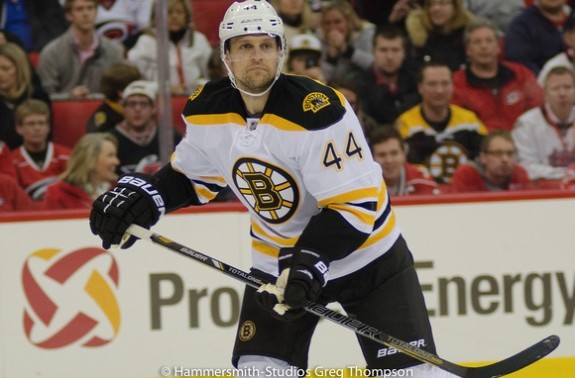
This trade was a landslide victory for Boston. This trade would have been a win for the Bruins even if Florida had only given up Matt Bartkowski. Since the trade, Bartkowski has played 131 regular season games, recording 24 assists in the process. Beyond that, Bartkowski has played 15 playoff games, recording a goal and three points. In total, Bitz, Weller, and Petrovic have played a combined total of 63 games, notching two goals and eight assists over that span.
Add in Dennis Seidenberg. Seidenberg became a top pair defenseman for the Boston Bruins, helping lead the team to their first Stanley Cup victory in 39 years. Seidenberg alone put up more playoff points in three playoff campaigns with the Bruins than the combined regular season totals for the group that went to Florida in this deal. Seidenberg put up two goals and 13 assists over 50 playoff games, while averaging upwards of 27 minutes of ice time per game.
Alexander Petrovic could still emerge for the Panthers, but this is a trade that Boston would make again in a heartbeat.
Phil Kessel for two (2010, 2011) 1st Round Picks (#2 Tyler Seguin, #9 Dougie Hamilton) and a 2010 2nd Round Pick (#32 Jared Knight)
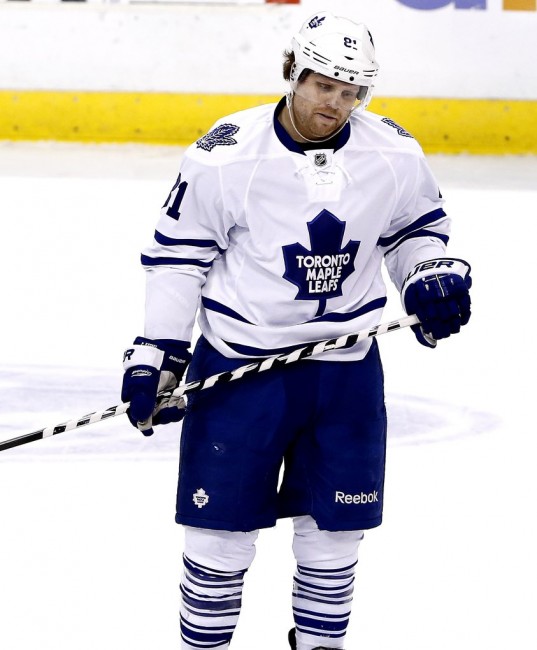
This trade gets the most recognition out of all of the trades Peter Chiarelli made for the Bruins. The most impressive part about this trade was not where the picks ended up falling, which was tremendously fortunate for Boston, but rather the circumstances that surrounded this deal. Phil Kessel, a restricted free agent at the time, had one foot of the door on his way to signing with the Maple Leafs. It seemed very unlikely that the Bruins would match the contract offer that Kessel ended up accepting from Toronto. If Brian Burke had signed Kessel to an offer sheet and Chiarelli did not match, the Bruins would have received the Maple Leafs 1st, 2nd, and 3rd round draft picks in 2010. Instead, by making the trade, Burke guaranteed that he got his man, while Chiarelli turned a 2010 3rd round pick into a 2011 1st round pick. That pick ended up being Dougie Hamilton, the only of the three selections that still remains in Boston’s organization.
Two seasons after this trade was made, the Bruins had won the Stanley Cup and the Maple Leafs had finished in the bottom third of the league for a second consecutive season. Kessel has yet to lead Toronto to a single playoff series victory, so even though there is a lot of animosity towards Chiarelli for trading Seguin, this is a trade Boston makes again every day of the week.
Mark Recchi and a 2010 2nd Round Pick (#36 Alexander Petrovic) for Martin Karsums and Matt Lashoff
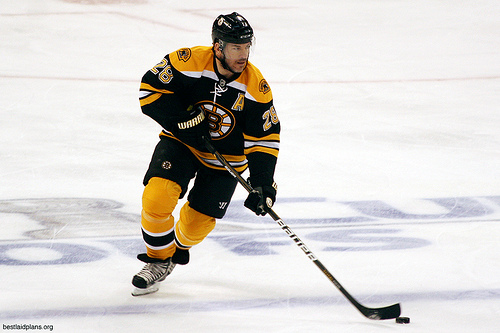
Acquiring a future Hall of Famer is impressive on its own. Managing to do so while only giving up two players that were surplus to requirements, even more impressive. Getting a 2nd round pick back with the future Hall of Famer makes this a steal.
Karsums and Lashoff ended up flaming out of the NHL within two and a half seasons. Mark Recchi would play a critical role for the Bruins in his three seasons with the team, seeing the team through to at least the Eastern Conference Semi-Finals every year. Recchi formed a dynamic second line with Patrice Bergeron and Brad Marchand, providing valuable leadership and experience in the process.
The 2nd round pick that Boston picked up in this deal wound up being the key piece in the deal that brought Dennis Seidenberg to the Bruins. This is another trade where the Bruins would have come out on top even if they only got one of the two pieces they received, but the fact that they got both Recchi and the pick makes this a landslide victory for Boston.
Nathan Horton and Gregory Campbell for Dennis Wideman, a 2010 1st Round Pick (#15 Derek Forbort), and a 2011 3rd Round Pick (#91 Kyle Rau)
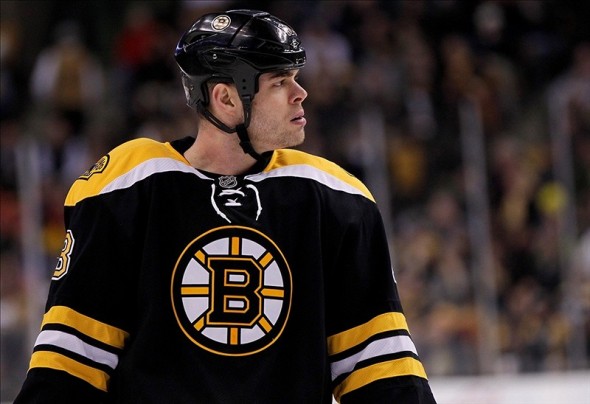
After squandering a 3-0 series lead to the Flyers in the Eastern Conference Semi-Finals the season before, the acquisition of Nathan Horton and Gregory Campbell gave fans a new reason for optimism.
Campbell was one season removed from career best in goals (13), assists (19), and points (32), while Horton had just wrapped up his fifth consecutive season with 20+ goals. Neither of the two would disappoint upon their arrival in Boston.
Horton established himself as the first line winger that Boston had been seeking, tallying 26 goals and 27 assists in the process. When the playoffs rolled around, it was apparent that we had yet to see the best of Nathan Horton. Prior to being injured in Game 3 of the Stanley Cup Finals, Horton had put up eight goals and nine assists in 20 games in the playoffs. In case that wasn’t impressive enough, Horton managed to score the game winning goals in both Game 7’s en route to the Stanley Cup Finals. Horton finished off the Montreal Canadiens in overtime in the Eastern Conference Quarter-Finals, then did the same to the Tampa Bay Lightning in the third period of Game 7 of the Eastern Conference Finals.
Campbell became a key contributor on the Bruins vaunted penalty kill, while also anchoring the fourth line between Daniel Paille and Shawn Thornton. Campbell matched his career best in goals and nearly matched his career best for assists in his first season with Boston, as the team went onto win the Stanley Cup.
The season prior to this trade, Dennis Wideman had seen his offensive production drop off, while he struggled in his own end. He would only play part of one season with Florida, seeing a slight uptick in offense to go along with his continued defensive struggles. He was ultimately traded to Washington at the deadline for Jake Hauswirth and a 3rd round pick. Wideman has constantly produced offensively from the backline, but his defensive struggles were not a good fit in Boston.
The first round pick was traded again at the draft, in the first of a number of trades the Panthers would make. The first round pick that Florida ended up making was #19, where they selected Nick Bjugstad, which has turned out to be an excellent selection. It’s tough to say how the Bruins would have drafted and developed the pick at #15 or #19 or whichever, but it’s pretty clear that Florida is happy with Bjugstad at this point.
Kyle Rau signed his entry level deal with the Panthers back in March, so he has yet to break into the NHL. As a senior as the University of Minnesota, Rau led the Gophers in goals with 20, while finishing second on the team in overall scoring with 41 points in 39 games. He projects to play in the NHL, so a final judgment can’t be made on his part of this deal.
While it wasn’t a steal by any means, this trade changed the landscape of Boston’s roster. Horton and Campbell ended up being major contributors on the ice and in the locker room, helping to build a close-knit group that would be a perennial contender for the Stanley Cup. In terms of trades that positioned the Bruins to win the Stanley Cup in 2011, this trade might have been the biggest.
Johnny Boychuk for Matt Hendricks
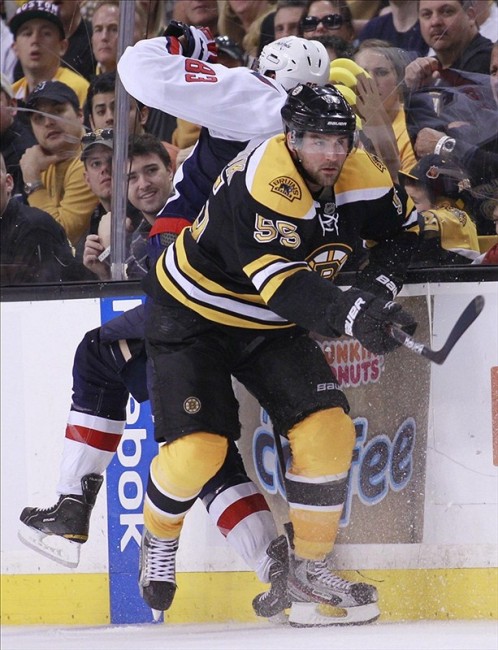
This isn’t a knock on Matt Hendricks, but a testament to the development of Johnny Boychuk. Boychuk came out of the gates on fire, shattering all of his personal bests in his first season with Providence. He earned himself a late season call up and began to make his mark. Before long, Boychuk had established himself as a top four defenseman for the Boston Bruins.
His physical presence, along with his offensive contributions, made him an extremely important part of Boston’s defensive corp. During his stay with the Bruins, he logged upwards of 23 minutes of ice time per game in the playoffs, and better than 20 minutes of ice time per game in the regular season. In total, over 317 regular season games with Boston, Boychuk posted 19 goals and 56 assists, while also adding 13 goals and 14 assists across 79 playoff games.
Matt Hendricks is still in the NHL, primarily playing a bottom-six forward role throughout his career. He left Colorado as a free agent, following his first full season with the Avalanche. Since the trade, Hendricks has put up 40 goals and 41 assists over 411 regular season games. Those numbers are decent enough for a bottom-six forward, but Boychuk almost matched Hendricks production from the blue line, while playing a physical brand of defense. Boychuk was the personification of the Bruins style of play during his six season in Boston, making this trade a big win.
Although it’s a sore spot at the moment for many fans, rather than letting Boychuk walk this summer as a free agent, Chiarelli dealt him for two 2nd round picks. One of those picks is the 37th overall pick in this year’s NHL entry draft, which is regarded as a very deep draft. These extra picks also gave Chiarelli the freedom to acquire Brett Connolly at this year’s trade deadline, who could become a valuable contributor for the Bruins in the near to long-term future.
Did I miss one? Was one of these a bad trade? Let me know what you think in the comments below or on twitter.